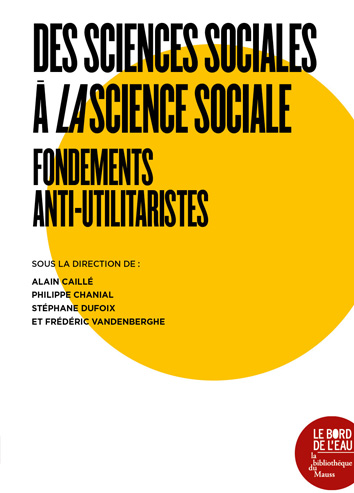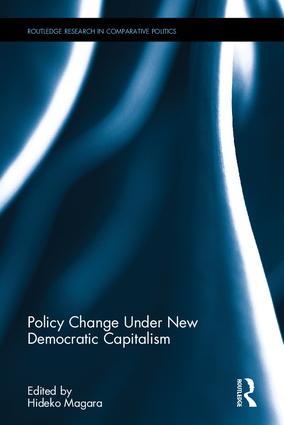Intervenants : Robert Boyer (Centre Cournot, Institut des Amériques), Xavier Ragot (OFCE), Les débats du Centre Cournot, en ligne, mars 2020.
Espagnol. Présentation Powerpoint, Conférence au Colegio de Mexico le 16 janvier 2020.
in Des sciences sociales à LA science sociale. Fondements anti-utilitaristes, Sous la direction de Alain Caillé, Philippe Chanial, Stéphane Dufoix et Frédéric Vandenberghe, 2018, Editions le bord de l’eau, Chap. III, p. 65-81
At a time when the quarrel rages between sociologists in France, as there is a year between economists, it is urgent to recall that the word “sociology” has long been used to refer to social science in general (including economics and political philosophy). as well as anthropology, history or geography) and that it is too important a thing to entrust to sociologists alone. It is the business of all social scientists. Alongside the specialized social sciences, it is a generalist social science, the only one capable of thinking of the world in all its complexity, that we must now make happen and institute. A social science that is also urgent to found once again on a non-utilitarian basis and in a resolute openness to all sociologies and all the social sciences of the whole world, and not only to those who come from ‘West. Replaced in this more general setting, most chapel quarrels resolve themselves. For the greater good of a shared desire to know. That such an objective is accessible is what the variety and quality of the authors gathered here, anthropologists, economists, geographers, historians, philosophers and sociologists testify to.
Presentation powerpoint at the Seminar “Planning and Long-Term Perspective in Economics”, INALCO, Paris, April 6th, 2018
Presentation to Colloque «Gouvernement, Participation et Mission de l’entreprise», Collège des Bernardins, Paris, 16 mars 2018
In Policy Change Under New Democratic Capitalism, Edited by Hideko Magara, Chapitre 10, Routledge, Abingdon et New York, 2017, p. 202-222.
About the Book
Democratic capitalism in developed countries has been facing an unprecedented crisis since 2008. Its political manageability is declining sharply. Both democracy and capitalism now involve crucial risks that are significantly more serious than those observed in earlier periods. The notion of policy regimes has gained new significance in analysing the possibilities for a post-neoliberal alternative. Policy innovations directed towards an economic breakthrough require both political leadership and a new economic theory. The processes of political decision making have become quite distant from the public realm, and a limited number of economic and political elites exert influence on public policy.
This book examines, from a policy regime perspective, how developed countries attempt to achieve such a breakthrough at critical junctures triggered by economic crises. It initially assesses the nature of the present crisis and identifies the actors involved. Thereafter, it provides an analytical definition of a crisis, stressing that most crises contain within them the potential to be turned into an opportunity. Finally, it presents a new analytical design in which we can incorporate today’s more globalized and fluid context.
Table of Contents
I.Introduction
1.New Models of Democratic Capitalism and Policy Regime Change (Hideko Magara)
II.Models of New Democratic Capitalism
2.Crisis, Oportunity and Democracy in Contemporary Europe (Philippe Schmitter)
3.The Rise of the European Consolidation State (Wolfgang Streeck)
4.Cost of Democracy: Changing Aspects of Modern Democracy (Hiroshi Shiratori)
5.Institutional Change and Regime Crisis: A Critical Viewpoint on Neoliberalism (Toshio Yamada)
III.Comparative analyses
6.The Political-Economic Implications of De-industrialization with Varieties of Capitalism: An EU-Japan Comparative Analysis (Hiroyasu Uemura and Shinji Tahara)
7.Growth, Employment and Social Security Governance in the EU and Japan (Koji Fukuda)
8.The Diversity of the ‘Neoliberal Policy Regime’ and Income Distribution (Yuji Harada)
IV.Regime Competition in International Rivalry and Cooperation
9.Using Neofunctionalism to Understand the Disintegration of Europe (Philippe Schmitter and Zoe Lefkofridi)
10.From the Variety of Socioeconomic Regimes to Contemporary International Relations (Robert Boyer)
11.Balance-of-Payments Constraints, Change in Income Distribution, and Economic Growth in the Era of Globalization (Hiroshi Nishi)
About the Series
Routledge Research in Comparative Politics
Subject Categories
BISAC Subject Codes/Headings:
- POL024000
- POLITICAL SCIENCE / Public Policy / Economic Policy
- POL033000
- POLITICAL SCIENCE / Globalization


